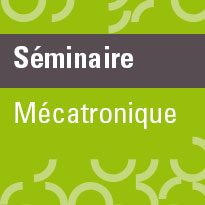A New Look at Shared Control for Complex Robotics Systems
le 4 décembre 2017
13h45-16h00
ENS Rennes, Amphithéâtre
Plan d'accès
Intervention de Paolo Robuffo Giordano, directeur de recherche au CNRS (Irisa / Inria Rennes), dans le cadre des séminaires "Magistère mécatronique".
Abstract
Nowadays and future robotics applications are expected to address more and more complex tasks in increasingly unstructured environments and in co-existence or co-operation with humans. Achieving full autonomy is clearly a "holy grail" for the robotics community: however, one could easily argue that real full autonomy is, in practice, out of reach for many years to come. The leap between the cognitive skills (e.g., perception, decision making, general ”scene understanding”) of us humans w.r.t. those of the most advanced nowadays robots is still huge. In most applications involving tasks in unstructured environments, uncertainty, and interaction with the physical word, human assistance is still necessary, and will probably be for the next decades.
These considerations motivate research efforts into the (large) topic of shared control for complex robotics systems: on the one hand, empower robots with a large degree of autonomy for allowing them to effectively operate in non-trivial environments. On the other hand, include human users in the loop for having them in (partial) control of some aspects of the overall robot behavior.
In this talk I will then review several recent results on novel shared control architectures meant to blend together diverse fields of robot autonomy (sensing, planning, control) for providing a human operator an easy "interface" for commanding the robot at high-level. Applications to the control of single/multiple mobile robots (quadrotor UAVs) for navigation purposes, and dual-arm manipulator systems for remote telemanipulation will be illustrated.
Nowadays and future robotics applications are expected to address more and more complex tasks in increasingly unstructured environments and in co-existence or co-operation with humans. Achieving full autonomy is clearly a "holy grail" for the robotics community: however, one could easily argue that real full autonomy is, in practice, out of reach for many years to come. The leap between the cognitive skills (e.g., perception, decision making, general ”scene understanding”) of us humans w.r.t. those of the most advanced nowadays robots is still huge. In most applications involving tasks in unstructured environments, uncertainty, and interaction with the physical word, human assistance is still necessary, and will probably be for the next decades.
These considerations motivate research efforts into the (large) topic of shared control for complex robotics systems: on the one hand, empower robots with a large degree of autonomy for allowing them to effectively operate in non-trivial environments. On the other hand, include human users in the loop for having them in (partial) control of some aspects of the overall robot behavior.
In this talk I will then review several recent results on novel shared control architectures meant to blend together diverse fields of robot autonomy (sensing, planning, control) for providing a human operator an easy "interface" for commanding the robot at high-level. Applications to the control of single/multiple mobile robots (quadrotor UAVs) for navigation purposes, and dual-arm manipulator systems for remote telemanipulation will be illustrated.
- Thématique(s)
- Diffusion des savoirs, Formation
- Contact
- Hamid Ben Ahmed (Hamid.Benahmed@ens-rennes.fr)
Mise à jour le 18 décembre 2017







